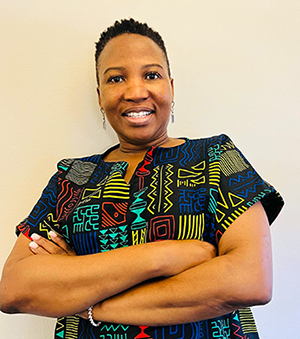Examining the Impact of AI on Higher Education and Business Strategy
The Department of Business Management in the School of Management Sciences recently held a virtual Dean Leadership Session under the theme “The role of artificial intelligence in higher education, business strategy and the economy’s competitiveness”. The event brought together esteemed experts and thought leaders to discuss the multifaceted implications of artificial intelligence (AI) in education, business strategy and economic development.
“It is highly significant that we have this first leadership session of 2024, particularly as we celebrate our 150th anniversary up to the end of June. This occasion is a celebration of our storied past and a resolute step towards the future, especially in the rapidly evolving landscape of higher education, business strategy and our economy. Our focal point today is the role of artificial intelligence (AI) in higher education, business strategy and the economy’s competitiveness,” said Dr MaseTshaba Mantepu, College of Economic and Management Sciences (CEMS) Acting Executive Dean.
Mantepu, a business process optimisation expert, emphasised the importance of embracing technology, particularly AI, to reduce human errors and enhance strategic thinking. She highlighted the need for upskilling and reskilling individuals to enable them to leverage AI effectively in professional settings.
Nicky Tjano, Director of Teaching and Learning Strategy at Unisa, was the guest speaker and shed light on the transformative impact of AI on teaching, learning and assessment practices in higher education. Tjano emphasised the ethical use of AI tools and the ongoing debates surrounding their implementation. He stressed the importance of understanding “graduateness” as a concept encompassing a diverse set of skills and attributes essential for success in the professional world.
The event featured other notable speakers, such as Prof Jerry Vilakazi, founder and executive chairman of Palama Investment, and Prof Raphael Mpofu, a distinguished academic and executive leader at Unisa. Vilakazi, who has extensive experience in various executive roles across the public and private sectors, provided valuable insights into the role of AI in driving economic transformation and competitiveness. Mpofu emphasised the importance of nurturing young talent and promoting innovation through initiatives such as the Inhlanyelo Hub NPC. He highlighted the role of AI in fostering entrepreneurship development and empowering young people to thrive in diverse industries.
Throughout the session, discussions revolved around the importance of aligning education with industry needs, the role of AI in addressing skills gaps, and successful AI integration initiatives. The speakers emphasised the link between AI-oriented countries and educational advancement, highlighting disparities in technological readiness and access to resources.
In addition, the speakers explored the link between AI-oriented culture and graduateness, emphasising how AI applications in education contribute to career exploration, skills building and employability. AI was recognised as a powerful tool for personalised learning, career guidance and job matchmaking, which is essential for preparing students for a workforce increasingly influenced by automation and technological advancement.
The programme was adeptly directed by Prof Kgaogelo Boya, Chair of the Department of Business Management, who did a great job orchestrating the discussions.

